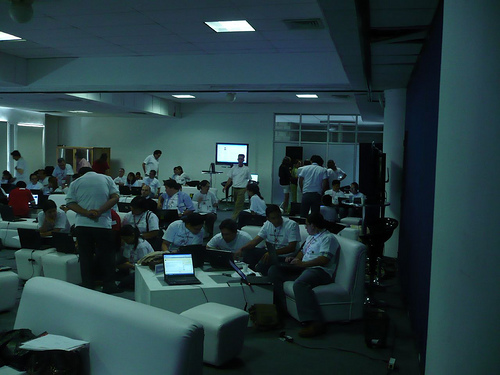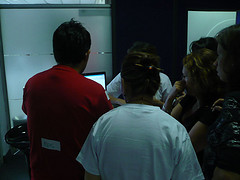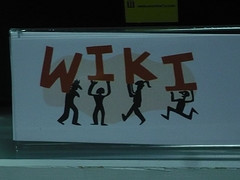The folks at SIAST kindly asked me to do the opening keynote for this year’s Tlt ’10 conference. Whenever someone asks me to keynote I really want to give them something new, partly out of a sense that they deserve it but also because for me, doing talks is one of my main forms of intellectual expression, where I get to work out new ideas and try to figure out new ways to communicate old ones. But as much as I wanted to, I just couldn’t this time; I am just too zoo’d with stuff at work etc.
So I dusted off my “Becoming a Network Learner: Towards a Practice of Freedom” talk that I originally delivered in December 2008 during my trip to Colombia.
Still, I did try to introduce some new material, which you can see in slides 53-59. The first two new slides simply tried to explain my “Open Educator as DJ” as another form of PLE workflow, but one which sees teaching others as one of the goals of learning on the network.
 The other new stuff, which is more important, but MUCH more raw, has been prompted by concerns that have been niggling me for years. I am not sure if these are “essential” effects of using the net, but I have experienced, and others have noted, that the net can lead us to pay possibly too much attention to the immediate, and not enough reflecting on what has happened or where we want to go. I take the emergence of the GTD movement to be very much an early reaction to this by people deeply immersed in learning/working with technology. I also worry about the phenomenon of the “echo chamber,” that diversity in our networks doesn’t just magically “happen.”
The other new stuff, which is more important, but MUCH more raw, has been prompted by concerns that have been niggling me for years. I am not sure if these are “essential” effects of using the net, but I have experienced, and others have noted, that the net can lead us to pay possibly too much attention to the immediate, and not enough reflecting on what has happened or where we want to go. I take the emergence of the GTD movement to be very much an early reaction to this by people deeply immersed in learning/working with technology. I also worry about the phenomenon of the “echo chamber,” that diversity in our networks doesn’t just magically “happen.”
So I tried to suggest that “on top” or “alongside” or “as part of” our PLE we need to incorporate techniques, practices (and tools) to help counterbalance the tyranny of “now” and “me”, to help learners realize that part of learning is looking at where you’ve been which helps with pattern recognition, reflection, and building an awareness of how we learn (meta-cognition.) And similarly, that we need to adopt practices to help us focus, build attention, stay on track amidst the the myriad distractions whose existence is part of the value of the network! (I think this is similar, though maybe not identical, to what Pat Parslow is getting at in this post on “Navigating your personal learning seascape.”) The solutions I seek aren’t about closing your laptops or turning off your cellphones, but instead are ways of inserting some meta- activities or tools into your regular activities in the hope of improving attention, reflection, pattern recognition, diversity.
 So, “examining where we’ve already been” might take the form of a plug-in like Wikipedia Diver that records and visualizes your wikipedia sessions, to simple suggestions like one Mike Caulfield made a few weeks back to make reviewing your browser history a regular activity. Using your blog as a constrained search engine, or even just searching your “outboard brain” are other examples of simple practices we can insert into our existing network flows that I think will increase reflection, help us learn what we know, know what we’ve learned.
So, “examining where we’ve already been” might take the form of a plug-in like Wikipedia Diver that records and visualizes your wikipedia sessions, to simple suggestions like one Mike Caulfield made a few weeks back to make reviewing your browser history a regular activity. Using your blog as a constrained search engine, or even just searching your “outboard brain” are other examples of simple practices we can insert into our existing network flows that I think will increase reflection, help us learn what we know, know what we’ve learned.
And what about moving forward – how to do this in a way that doesn’t fall prey to either the tyranny of the now (helps us know and follow through on our intent) but also isn’t just an echo chamber. I have few answers here – I DO think the whole GTD-type movements, Inbox Zero, etc, are speaking to this and skills we can help network learners adopt. Similarly the idea that people need to become personal project managers. Counter-balancing the “echo chamber”? I am leery to suggest that this is solely a network problem – we see this in many aspects of life. And just like there, I think there is no substitute for choosing to engage The Other, to listen to those you don’t agree with or identify with, in order to build understanding and empathy. Can we technologize such a thing. I don’t know.
As I said, very raw, but I put them out here, raw as they are, in case they resonate with others and they can start to build on them. So what do you think – are their techniques, practices or technologies that you can suggest to insert into a network learner’s workflow that will help counterbalance these effects and help cultivate attention, meta-cognition, reflection, intent? Is this even a problem, or if so, is it perhaps not specific to network learning but just learning in general? Please help me clarify my own thoughts on this. I am a slow learner, and am intuiting more than I can effectively communicate or prove here. – SWL


 But, in the spirit of a ‘camp,’ this was not a one-way exchange (hindered though I was by my absolute lack of Spanish, something I very much regret.) I truly learned much from the experience, both about the amazing country of Colombia, but also about how we should be running professional development workshops. The educamps were very inspiring. Every attention to detail had been paid to create the enabling conditions for learner-supported and learner-directed learning to occur.
But, in the spirit of a ‘camp,’ this was not a one-way exchange (hindered though I was by my absolute lack of Spanish, something I very much regret.) I truly learned much from the experience, both about the amazing country of Colombia, but also about how we should be running professional development workshops. The educamps were very inspiring. Every attention to detail had been paid to create the enabling conditions for learner-supported and learner-directed learning to occur.
 ools (they did not focus on single specific tools but instead general classes, like ‘Readers’ or ‘social bookmarking tools’) with which they had experience. In doing this, partly they were making a promise to other learners that if someone came up and asked them about one of their tags, they would talk to them about it.
ools (they did not focus on single specific tools but instead general classes, like ‘Readers’ or ‘social bookmarking tools’) with which they had experience. In doing this, partly they were making a promise to other learners that if someone came up and asked them about one of their tags, they would talk to them about it.